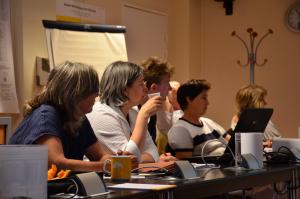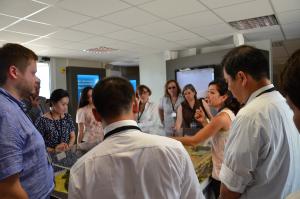The challenge of communicating a grand project
6 Jul 2012
-
Sabina Griffith
Swapping news in order to further enhance communication within the world-spanning fusion community is the main goal of the annual meeting.
"Inspiring," was the comment from Gieljan de Vries from the Dutch Institute for Fundamental Energy Research (DIFFER) after last week's meeting with the communication staff from the ITER Organization, the seven Domestic Agencies and other major fusion labs. "There are nice ideas floating around to get more cooperation going."
The communication teams from the ITER Organization and the Domestic Agencies meet once a year in person. Monthly video conferences fill the gap and are useful for keeping up with one another, but these cannot replace face-to-face discussions on how to develop and implement new ideas and joint strategies.
Last week, 28-29 June, the international communicators for the project met at the ITER Headquarters in Cadarache to swap news and—in order to further enhance communication within the world-spanning fusion community—this time the "circle of friends" was expanded. For the second time, Petra Nieckchen, the head of communication at EFDA/JET, joined the meeting, as did Gieljan de Vries, DIFFER; Annie-Laure Pecquet and Jean-Marc Ané, Institut de la Recherche sur la Fusion Magnetique (IRFM); Isabella Milch, Max-Planck-Institute for Plasmaphysics (IPP); and Kitta McPherson, Princeton Plasma Physics Lab (PPPL).
The first day of this two-day exchange was devoted to reports on the most recent progress in each ITER Member. It soon became obvious that action is now shifting toward industry, judged by the number of facts, figures, and photographs that were presented.
Anais Padilla from the ITER Joint Visit Team introducing the visitors to the main attractions of the construction site.
Guests were also treated to a tour around the ITER construction site and a close-up look into the Tokamak Pit. While for many of the 25 participants this was not the first time on site, progress made since their last visit was tangible. For others, it was a very welcome opportunity to see the action first hand rather than looking at the (regularly updated!) construction images on the ITER website.
The second day started with a tour to the neighbouring Tore Supra Tokamak and a demonstration of how the design development and design integration is done at ITER with the help of a "virtual reality" room, a 3D-experience that left the group very impressed.
Back from this excursion it was time to meet Robert Matthews, an award-winning science journalist who worked as correspondent for The Times and The Sunday Telegraph. He is currently a science consultant for BBC Focus. He also reads physics at Oxford University, is a chartered physicist, and a fellow of the Royal Astronomical Society.
He spoke about the challenges of communicating a grand challenge project such as ITER. His presentation and the following discussion, to which a second guest-speaker, Norbert Frischauf—a high-energy physicist and communication consultant—joined in, proved highly inspiring and will certainly have an impact on how we view and understand our work in the future.



